When students walked through the doors of the Marygrove Early Education Center (Marygrove EEC) for the first time on September 7, 2021, they excitedly entered a facility designed to nurture their development, revitalize a community, and redefine what’s possible in early childhood education (ECE).
For them, it was the opportunity to meet teachers and classmates on the first day of school and to get acclimated to the newly opened facility. For almost everyone else in attendance, it was a celebration of what happens when capital is aligned with justice, partners from different sectors work collaboratively to address systemic challenges, and the needs of the community come first.
Developed by IFF, the Marygrove EEC represents a historic investment in early childhood programming in Detroit and a significant step toward the realization of a Kresge Foundation-led initiative to create a cradle-to-career campus (P-20) on the former Marygrove College grounds. Backed by a $75 million commitment from Kresge intended to catalyze additional investments in Northwest Detroit, the P-20 model is designed to support children in the Livernois-McNichols neighborhood from birth until they secure employment that enables them to thrive.
At the Marygrove EEC, 144 children under the age of five have access to quality ECE in a neighborhood that accounts for one-third of the unmet demand for ECE slots in the city. Wraparound supports like prenatal education, parenting classes, and behavioral and developmental health services further amplify its impact, as does its use as a hub for community-based childcare providers to observe best practices in the classroom, access professional development opportunities, and participate in training to get credentialed. This, in turn, bolsters the ECE ecosystem in Detroit by ensuring that the impact of the Marygrove EEC reaches beyond its walls and into the community.
The Marygrove EEC was financed with approximately $22 million in New Markets Tax Credits. IFF provided a bridge loan of approximately $7.57 million prior to permanent financing being secured, with additional predevelopment funding coming from The Kresge Foundation. Additional partners crucial to the development of the state-of-the-art ECE facility include Starfish Family Services, the University of Michigan School of Education, Marygrove Conservancy, Detroit Public School Community District, and the Detroit Collaborative Design Center.
The photos below – taken by Timothy Hursley – showcase the new space, which serves as a model for how to put early childhood education at the center of community revitalization efforts.
Community-informed design
With the support of Detroit Collaborative Design Center, IFF and Starfish Family Services (which operates the Marygrove EEC) led an exhaustive community engagement process designed to solicit input from parents, caregivers, and existing childcare providers in the neighborhood surrounding Marygrove about the design aesthetic and service offerings they desired in a new ECE center.
Learnings during the process informed Marlon Blackwell Architects’ design for the single-story, 28,871-square-foot facility, which is located next to the historic Liberal Arts building on the Marygrove campus. The facility was constructed by Barton Malow, which committed 29 percent of its construction spending to minority- and women-owned businesses.

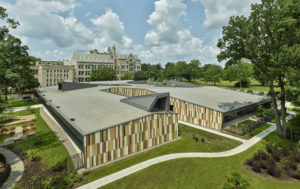



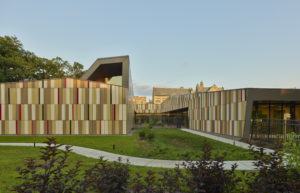
Bringing the outdoors, indoors
Centered around three interior courtyards with floor-to-ceiling windows that maximize natural light, the Marygrove EEC is designed to foster a sense of connection between children, teachers, staff, and their environment.
“Everything that a child needs from early childhood education doesn’t happen in the classroom,” says Rachel Sikora, who oversaw construction as IFF’s senior owner’s representative. “That concept was central to the design process. The design of the facility creates opportunities for children to experience the outdoors – even when they’re inside.”



Flexible, accessible learning spaces
The Marygrove EEC features 12 spacious classrooms and dedicated spaces to support students’ holistic development. Universal access principles were incorporated into the design, meaning that children with disabilities are able to reap the full benefits of attending the Marygrove EEC.
“The building is designed to fit form and function,” says Celina Byrd, the principal of the Marygrove EEC. “The space supports creativity, critical thinking, problem solving, encourages children to ask questions, and helps them connect with the world around them.”
In its first several months in operation, the Marygrove EEC is living up to expectations. As one parent of a Marygrove EEC student recently told The Kresge Foundation, “I am filled with hope, joy and gratitude. So much thought, love, and research went into building this school. My heart is full. Our children are blessed and deserving.”
While the cutting-edge design of the facility is optimized to support young learners, so too is the classroom instruction. Starfish and the University of Michigan School of Education have collaborated to develop high-quality curricula for the Marygrove EEC that focuses on literacy, STEM, and social justice. Starfish also encourages individual development to be responsive to each child’s interests, strengths, and needs.




Dedicated spaces for adults too
The Marygrove EEC also includes dedicated spaces designed to support the wellbeing of Starfish’s teachers and staff, which can also be used to host community-based ECE providers for knowledge sharing and professional development.
“Part of the vision for Marygrove’s P-20 continuum is to support the broader community,” says Ashanti Bryant, IFF’s director of early childhood services. “ECE providers from all over Detroit have an unbelievable venue for professional development, whether observing in classrooms or participating in teacher training academies to get credentialed. Quality facilities matter, and we want every ECE provider in the city to have the opportunity to learn firsthand the power of the facility as another teacher.”
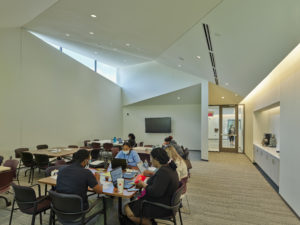
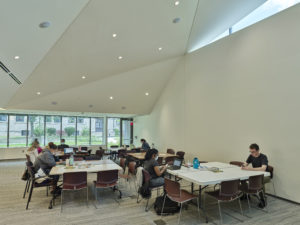
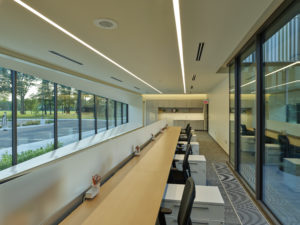
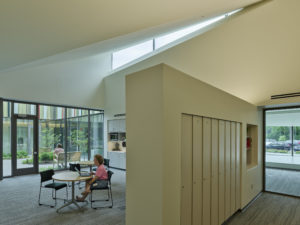
And plenty of room for play
While the interior of the Marygrove EEC was designed to bring the outdoors in, students also benefit from a 30,000-square-foot natural playscape adjacent to the facility. Nestled in a grove of oak trees, the playscape provides space for children to play and explore in nature.
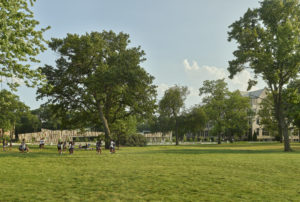
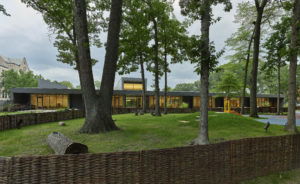
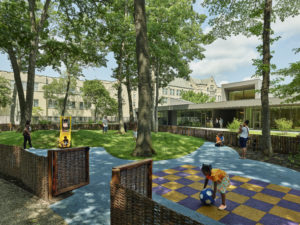
To learn more about the Marygrove EEC, visit our resource hub. To see more of the facility, watch this virtual tour.
Tags: : Capital Solutions, Community Development Solutions, Early Childhood Education, Real Estate Solutions